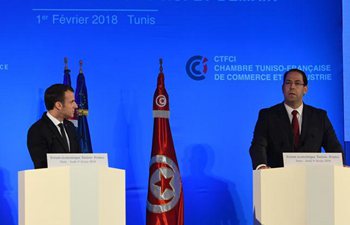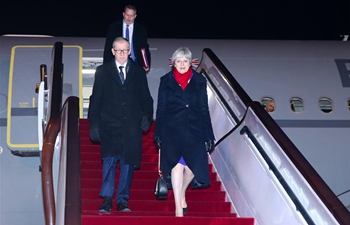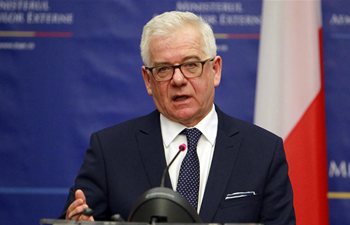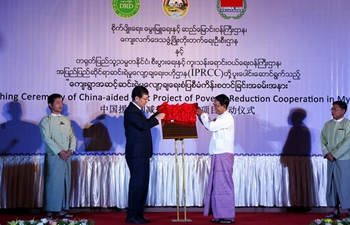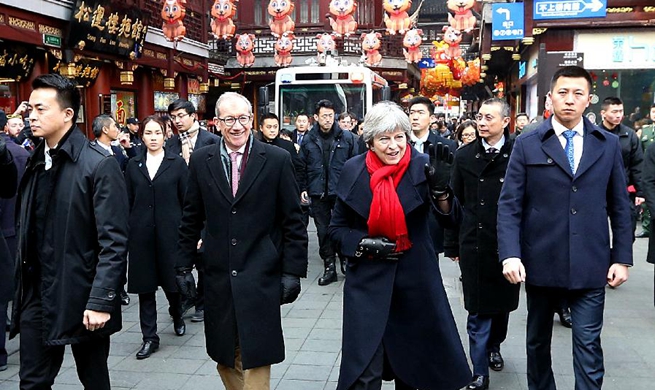LUSAKA, Feb. 2 (Xinhua) -- A plan by authorities in Zambia to introduce regulation for the social media has sparked a debate in the southern African nation.
The government said last month that it will press ahead with its plans to introduce laws to regulate the internet following complaints over abuse.
Among the complainants is presidential spokesperson Amos Chanda who officially wrote to the Inspector-General of the Zambia Police Kakoma Kanganja over repeated forgery and altering of State House statements which were posted on various social media sites.
The presidential spokesperson told journalists recently that a specialized team of police officers dealing with such matters had already interviewed him.
"We have been talking about the abuse of social media and the digital space and I have since formally written to the inspector-general of police expressing our displeasure at the repeated forgery and altering of State House statements and generally other abuses regarding social media and other fora," he said.
As a result, the ministry of transport and communications says it will enact various laws this year to ensure that the abuse of the internet does not get out of hand.
Among the bills include the Data Protection Bill, Cyber Security Bill and the E-commerce Bill.
Minister of Transport and Communications Brian Mushimba was, however, quick to point out that the move should not be interpreted as the government's desire to close social platforms like Facebook which was extremely popular in the country.
The bills were meant to create a legal environment so that consumers of internet and internet services were protected.
The government, he said, was concerned with the ongoing abuse of the internet which was manifested in cyber bullying, posting of fake news, fraud and the creation of fake accounts.
But the announcement has been received with mixed reaction from a cross section of society, with some stakeholders accusing the government of trying to stifle freedom of expression.
Lewis Mwape, executive director of the Zambia Council for Social Development, said the government's intentions to take to parliament bills aimed at regulating social media was a choke on freedom of expression.
"It is an impediment to the country's freedom of expression as people will find it difficult to openly discuss national matters amid fears of being prosecuted," he said.
According to him, curtailing any media platform was an assault on the country's democracy, adding that freedom of expression should not be trampled upon like it has happened with the freedom of assembly.
The Zambian Bloggers Network, a network of individuals running various blogs on social media platforms, believes that state regulation of the social media was not the right way to go.
Brenda Zulu, a member of the network, said bloggers believe that self-regulation of content online was the best move.
However, Edward Nyambe, a social and political commentator, believes that the government's plan was to regulate social media usage just like it has done in other sectors.
"Government regulates speed on the roads to protect citizens; Government regulates use of products by putting expiry dates on foods in supermarkets to protect citizens; Government regulates other potential abuses that the public could be exposed to," he said.
"A government that leaves its citizens exposed unchecked is a bad government. I support the minister in ensuring that consumer protection is extended to the internet," he added.
According to him, the increased cyber bullying and criminal activities on the internet affirms the need to regulate social media.
The Zambia Information and Communication Technology Authority, the country's telecommunication and technology regulator, says regulating social media was inevitable in the wake of rampant abuse.
Patrick Mutimushi, director-general of the regulator said it was unfortunate that irresponsible use of social media where people were being insulted, abused, impersonated, or defrauded was on the increase hence the need for regulation.
The continued irresponsible use of social media has negative social and cultural implications on the country, he added in a statement.
According to the regulator, the country has been recording an increase in the number of internet users, with the figure reaching 6.1 million as at end of 2016, representing a penetration rate of 39 percent.






